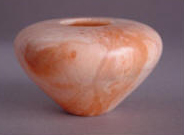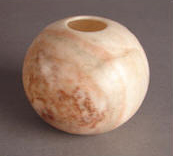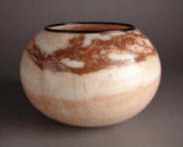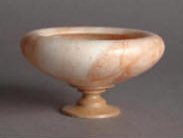





|
Alabaster
is a soft stone that has been used for thousands
of years for carving and shaping into artistic
and utilitarian objects. It is also known as
gypsum or hydrated calcium sulfate that formed
with heat and pressure from the deposits of
calcium rich shells and skeletons of sea creatures
over millions of years. The stone has a translucency
that augments the variety of colors and patterns
that include white, pink, green, red and black
colors that result from other mineral impurities.
The appearance is enhanced by the naturally
occurring cracks and fractures that occur in
the stone. The majority of the alabaster used
in my creations comes from Colorado. Each project
starts from a block weighing up to several hundred
pounds. It is initially cut and shaped into
a rough cylindrical form using a combination
of hand tools and electrical saws and grinders.
The piece is then mounted on a lathe using a
pin chuck and a variety
of scrapers are used to rough turn the outside
shape. The stone is then stabilized by a process
of using a vacuum system to pull a
dilute solution of polyvinylacetate glue into
cracks and fissures.
The subsequent hollowing process on the lathe
determines the thickness of the walls and the
amount of translucency that the finished piece
will have and establishes surfaces for final
carving, texturing or the addition of wood rims.
Extensive sanding with
grits down to 2000 results in a highly polished
surface that is
then cleaned with mineral spirits and a oil
or varnish finish is applied, followed by a
buffed wax finish.
The
cutting and turning processes are very dusty
and require good safety equipment including
eye, ear and lung protection.
I have been interested in three dimensional
art as long as I can remember and developed
an eye for spatial relationships many years
ago. My earliest work was done in wood, producing
various styles of carvings. Wood remains one
of my favorite media to work with due to its
huge variety of colors, textures and ease of
working.
I have been working with alabaster over the
last several years and love the feel and look
of the finished product. The colors and translucency
of alabaster makes it a wonderful media for
turning a range of vessels that can be further
carved, shaped and textured to result in one-of-a-kind
creations. The combination of alabaster with
wood leaves unlimited opportunity to explore.
|

